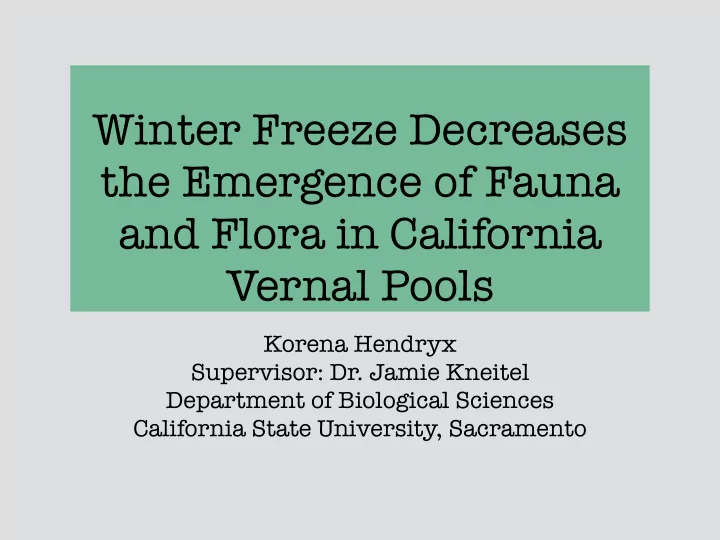

Winter Freeze Decreases the Emergence of Fauna and Flora in California Vernal Pools Korena Hendryx Supervisor: Dr. Jamie Kneitel Department of Biological Sciences California State University, Sacramento
• Overall temperature slowly increasing • Climate still highly variable • Extremely cold temps • Extremely dry conditions
California Vernal Pools • Seasonal ponds/ wetlands • Variable in size • <10% habitat remains • High (>60) diversity & endemism
Questions 1. How does extreme climate variation, such as freezing temperatures, affect species densities in California vernal pools? 2. How does community size affect the invertebrates, plants, and water quality of California vernal pools?
Vernal Pool Invertebrates
Vernal Pool Plants
Methods Twenty vernal pool • microcosms were established Manipulated volume • and temperature (freezing) Weekly sampling of • water quality and organisms
Results 40 p = .0078 Invertebrate density 30 20 10 p = 2.015e-08 5.5 0 5.0 No Yes ln (Plant density) 4.5 Freeze treatment 4.0 3.5 3.0 2.5 No Yes Freeze treatment
Results
Summary Freezing (-) (-) (-) (+) Invertebrates Plants Algae (-) (-) ? Phosphate & Turbidity eutrophication
Conservation Implications • Many of the endemic species in vernal pools are already in danger of extinction • Vernal pools provide many ecosystem services including: breeding habitat for birds, nutrient cycling, groundwater recharge, flood control • A better understanding of the environmental complexities of temporary wetlands will strengthen the conservation and management of these unique ecosystems
Acknowledgements • Luis Rosas-Saenz • Robert Brewer • Sulie Ober • STAR Program
"This project was supported by a grant to the STAR program from the Howard Hughes Medical Institute." "This material is based upon work supported by the National Science Foundation through the Robert Noyce Teacher Scholarship Program under Grant No. (grantee must enter NSF grant number). Any opinions, findings, and conclusions or recommendations expressed in this material are those of the author(s) and do not necessarily reflect the views of the National Science Foundation."
Questions?
Recommend
More recommend